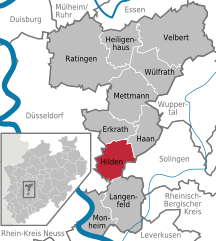Hilden
| Hilden | ||
|---|---|---|
|
||
| Coordinates: 51°10′17″N 6°56′22″E / 51.17139°N 6.93944°ECoordinates: 51°10′17″N 6°56′22″E / 51.17139°N 6.93944°E | ||
| Country | Germany | |
| State | North Rhine-Westphalia | |
| District | Mettmann | |
| Government | ||
| • Mayor | Birgit Alkenings (SPD) | |
| Area | ||
| • Total | 25.96 km2 (10.02 sq mi) | |
| Population (2015-12-31) | ||
| • Total | 55,185 | |
| • Density | 2,100/km2 (5,500/sq mi) | |
| Time zone | CET/CEST (UTC+1/+2) | |
| Postal codes | 40721,40723,40724 | |
| Dialling codes | 0 2103 | |
| Vehicle registration | ME | |
| Website | www.hilden.de | |
| Largest groups of foreign residents | |
| Nationality | Population (2012) |
|---|---|
|
|
985 |
|
|
700 |
|
|
495 |
|
|
416 |
|
|
386 |
Hilden is a city in the German state of North Rhine-Westphalia. It is situated in the District of Mettmann, 10 km (6.21 mi) west of Solingen and 15 km (9.32 mi) east of Düsseldorf on the right side of the Rhine. It is a middle sized industrial town with a forest and numerous attractions.
The Mayor is Mrs. Birgit Alkenings, who took office in 2014. She was a candidate of the Social Democratic Party of Germany (SPD).
With approx. 57,000 inhabitants, Hilden is the fourth largest city in the District of Mettmann. In contrast to the surrounding cities, it has no suburban districts or incorporated villages. Hilden has a compact urbanized city centre and borders some smaller woods.
Hilden was named in written sources already in the 10th century. In the 13th century in the centre of the early settlement a Romanic church was erected, which during the Reformation became Protestant. Later a second church for Catholics had been built. In the time of industrialization many factories especially in textiles, engineering and painting had been founded. In both World Wars the people of Hilden had many losses, a list of the soldiers' names is written on a memorial. During the Nazi rule Jews and opponents of the regime have been persecuted. In the factories forced labourers, allegedly 3000, have been employed.
In 1945 American troops, then units of the British Army of the Rhine had occupied the town, stationed in the local barracks erected in 1937. The relationship between the population and the British soldiers were good especially after Germany's accession to NATO in May 1955, when former adversaries became allies. The initiative of the regiment to get in touch with local citizens led to the twin partnership Hilden - Warrington (1968), to school exchanges and various contacts between people. In March 1968 the British troops left Hilden, having been replaced by German military units which took over the barracks.
In the aftermath of the War refugees from East Germany found a new home in Hilden nearly doubling its population. In 1956 the Council of Hilden granted patronage to the association of refugees from the town and district of Wohlau, Lower Silesia. They held several meetings in Hilden with more than 1000 former Wohlau citizens having received refuge in various parts of Germany.
...
Wikipedia




